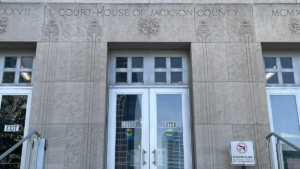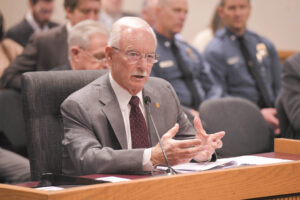14:52
News Story
Republican state attorneys general oppose new gag order in Trump documents case

Former U.S. President Donald Trump appears in court for his trial for allegedly covering up hush money payments on April 23, 2024, at Manhattan Criminal Court in New York City. Trump faces 34 felony counts of falsifying business records in the first of his criminal cases to go to trial (Brendan McDermid-Pool/Getty Images).
Twenty-four Republican state attorneys general, including Missouri’s, have interceded in the classified-documents prosecution of Donald Trump, opposing special counsel Jack Smith’s request that the trial judge bar Trump from making hostile statements against federal law enforcement.
In a 27-page amicus brief filed by Florida Attorney General Ashley Moody, the states complain that Smith’s motion to amend the former president’s bail conditions amounts to interference in the presidential election.
“The free-speech right is at its strongest when it protects political speech,” the brief says.
“Yet special prosecutor Jack Smith, on behalf of the United States, asks this court to curtail that right by ordering a prior restraint on President Trump’s constitutionally protected speech. Such an order is presumptively unconstitutional,” the document continues.
Republican AGs in Iowa, West Virginia, Alabama, Alaska, Arkansas, Idaho, Indiana, Kansas, Kentucky, Louisiana, Mississippi, Missouri, Montana, Nebraska, North Dakota, Ohio, Oklahoma, South Carolina, South Dakota, Tennessee, Texas, Utah, and Wyoming have joined Moody’s brief.
“If granted, this request would prevent the presumptive Republican nominee for president of the United States from speaking out against the prosecution and the criminal trial process that seek to take away his liberty,” the brief reads.
“That prosecution, of course, is led by a department that President Trump’s political opponent controls,” it adds, referring to Joe Biden and the U.S. Department of Justice.
“Once again, we are witnessing a prosecutor seek to keep the presumptive Republican nominee for president from speaking in the midst of an election. The First Amendment, at its core, is designed to protect political speech, and I along with my colleagues will not stand idly by and watch the Biden administration trample the free speech of a Florida citizen,” Moody said in a written statement.
Trump stands accused of willfully retaining national defense information, conspiring to obstruct justice, and destroying evidence in the case before U.S. District Judge Aileen Cannon in Fort Pierce, a Trump appointee.
Meanwhile, the U.S. Supreme Court is considering Trump’s claim for presidential immunity from federal criminal charges of plotting to overturn the 2020 presidential election. A trial on racketeering and conspiracy charges arising from his alleged attempt to interfere with the election is on hold in Georgia state court.
On May 30, Trump was found guilty of 34 felony counts of falsifying business records to cover up hush money payments to a porn star to influence the outcome of the 2016 presidential election.
‘Significant, imminent, and foreseeable danger’
On May 24, Smith filed a motion to alter Trump’s conditions of release “to make clear that he may not make statements that pose a significant, imminent, and foreseeable danger to law enforcement agents participating in the investigation and prosecution of this case.”
Trump and his supporters made “several intentionally false and inflammatory statements,” Smith argued, “that distort the circumstances under which the Federal Bureau of Investigation planned and executed the search warrant at Mar-a-Lago,” during which federal agents seized the classified documents at issue.
Trump and others cited a wording in the search warrant reiterating the FBI’s “standard and unobjectionable language setting out the Department of Justice’s use-of-force policy, which prohibits the use of deadly force except ‘when the officer has a reasonable belief that the subject of such force poses an imminent danger of death or serious physical injury to the officer or to another person,’” Smith’s motion says.
It notes that agents coordinated with Trump’s Secret Service detail and entered when Trump was away from his home.
“Trump, however, has distorted the standard inclusion of the policy limiting the use of deadly force by mischaracterizing it as a claim that the FBI ‘WAS AUTHORIZED TO SHOOT ME,’ was ‘just itching to do the unthinkable,’ and was ‘locked & loaded ready to take me out & put my family in danger,’” the document continues.
“Those statements create a grossly misleading impression about the intentions and conduct of federal law enforcement agents — falsely suggesting that they were complicit in a plot to assassinate him — and expose those agents, some of whom will be witnesses at trial, to the risk of threats, violence, and harassment.
“The court has an independent obligation to protect the integrity of this judicial proceeding and should take steps immediately to halt this dangerous campaign to smear law enforcement.”
Campaign ‘in full swing’
Attorneys for Trump, in a brief filed Friday, cited Smith’s “most recent shocking display of overreach and disregard for the Constitution.”
It accuses Smith of seeking “to restrict President Trump’s campaign speech as the first presidential debate approaches at the end of this month. Smith’s motion goes one step further in his efforts to interfere in the 2024 presidential election and assist President Biden, by seeking improper restrictions on President Trump’s core protected speech that would continue through the Republican National Convention in July, and thereafter, until this case is dismissed for one or more of the myriad reasons we have identified.”
Moody’s brief argues that restricting Trump’s speech would require showing of a “clear and present danger to the administration of justice.” She’s a Republican who has been an ardent supporter of the former president, filing numerous legal proceedings supporting him and attacking President Biden.
“The special prosecutor cannot make that showing because he has not demonstrated that President Trump’s comments have threatened law enforcement or that his comments have resulted in threats to law enforcement,” her latest brief says.
“[T]he presidential campaign is in full swing. As Americans turn their attention to the upcoming presidential election, courts should take special care to ensure voters can judge the candidates on their own merits. A prior restraint that might limit a candidate’s ability to campaign must meet exacting standards. The proposed order here would not meet those standards,” the brief adds.
This story originally appeared in the Florida Phoenix, a States Newsroom affiliate.
Our stories may be republished online or in print under Creative Commons license CC BY-NC-ND 4.0. We ask that you edit only for style or to shorten, provide proper attribution and link to our website. AP and Getty images may not be republished. Please see our republishing guidelines for use of any other photos and graphics.




